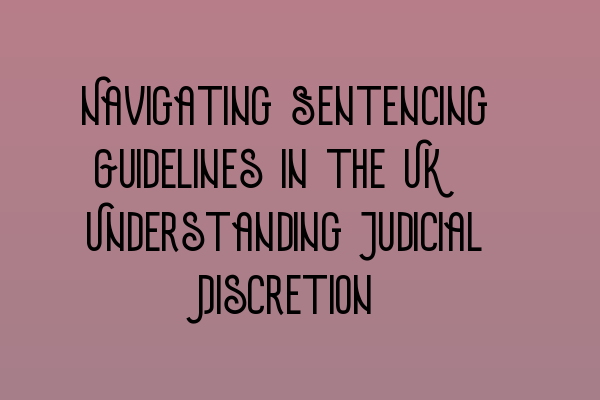Navigating Sentencing Guidelines in the UK: Understanding Judicial Discretion
Welcome to the SQE Criminal Law & Practice Law UK blog, where we provide valuable insights into various aspects of criminal law. In this article, we delve into the topic of navigating sentencing guidelines in the UK and the importance of understanding judicial discretion.
Before we dive into the details, it’s essential to have a clear understanding of what sentencing guidelines are. Sentencing guidelines are frameworks created by the Sentencing Council in the UK that assist judges in determining appropriate sentences for specific criminal offenses. They provide a consistent approach to sentencing, ensuring fairness and transparency in the justice system.
However, it’s important to note that while sentencing guidelines offer guidance to judges, they do not dictate a fixed sentence for a given offense. Judicial discretion comes into play, allowing judges to consider the unique circumstances of each case and make decisions accordingly.
Understanding judicial discretion is crucial for both legal professionals and individuals involved in criminal cases. It helps ensure that sentences are proportionate, taking into account factors such as the seriousness of the offense, the defendant’s culpability, and any aggravating or mitigating factors.
The Role of Legal Professionals
Legal professionals, such as solicitors and barristers, play a significant role in navigating the complexities of sentencing guidelines and advocating for their clients. By staying up to date with the latest guidelines and case law, they can provide knowledgeable and effective representation.
When representing a client, legal professionals will analyze the specific circumstances of the case and assess how the guidelines apply. They will then present persuasive arguments to influence the judge’s discretionary powers in favor of their client.
It is important to note that effective communication and advocacy skills are crucial when presenting arguments on behalf of clients. Legal professionals should be skilled in articulating their points concisely and persuasively to ensure the judge fully understands the nuances of the case.
Factors Influencing Judicial Discretion
Several factors can influence the exercise of judicial discretion when applying sentencing guidelines. These factors may vary from case to case and can significantly impact the outcome of a sentencing decision. Some of the essential factors to consider include:
- Previous Convictions: The defendant’s prior criminal record can influence the judge’s decision, especially if there is a pattern of repeated offenses.
- Aggravating or Mitigating Factors: Circumstances that make the offense more severe or less serious, such as the use of violence, the defendant’s age, or any remorse shown, can sway the sentencing decision.
- Victim Impact Statements: Statements from victims or their families can provide valuable insight into the consequences of the offense and may impact the judge’s decision.
- Public Interest: The judge must consider the wider public interest when determining an appropriate sentence, weighing factors such as deterrence, protection of the public, and the need for rehabilitation.
Legal professionals should thoroughly analyze these factors and present them effectively to influence the judge’s discretion towards a favorable outcome for their clients.
Staying Informed and Preparation
To effectively navigate sentencing guidelines, legal professionals should stay informed about changes and updates in the law. This is especially important as guidelines can evolve over time to reflect shifts in societal attitudes, legal precedents, and other factors.
At SQE Criminal Law & Practice Law UK, we offer SQE 1 and SQE 2 preparation courses to equip aspiring legal professionals with the knowledge and skills necessary for a successful career in criminal law. Our courses cover various topics, including sentencing guidelines, ensuring you have a comprehensive understanding of the subject.
If you’re preparing for the SQE exams, we also provide SQE 1 practice exam questions and SQE 1 practice mocks FLK1 FLK2 to help you assess your knowledge and refine your exam technique.
Additionally, it is important to stay up to date with the latest SRA SQE exam dates to ensure you are well-prepared and able to plan your studies effectively.
In conclusion, understanding judicial discretion and navigating sentencing guidelines play a vital role in the criminal justice system. Legal professionals need to be well-versed in these concepts to provide effective representation for their clients. At SQE Criminal Law & Practice Law UK, we are committed to providing comprehensive preparation courses and resources to support aspiring legal professionals on their journey to success.
For more information about SQE 1 and SQE 2 preparation courses, visit our SQE 2 Preparation Courses and SQE 1 Preparation Courses pages. If you’re looking for SQE 1 practice exam questions or practice mocks FLK1 FLK2, check out our SQE 1 Practice Exam Questions and SQE 1 Practice Mocks FLK1 FLK2 resources.
Stay informed, stay prepared, and excel in your criminal law career.
